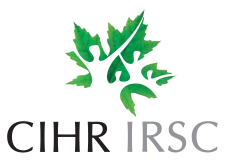Canadian Institutes of Health Research
 Logo of CIHR | |
| Abbreviation | CIHR |
|---|---|
| Predecessor | Medical Research Council of Canada |
| Formation | June 7, 2000 (2000-06-07) |
| Type | Governmental organization |
| Legal status | federal Departmental Corporation |
| Purpose | health research: to "excel, according to internationally accepted standards of scientific excellence, in the creation of new knowledge and its translation into improved health for Canadians, more effective health services and products and a strengthened Canadian health care system." |
President | Michael Strong |
Main organ | Governing Council |
| Subsidiaries | 13 institutes |
| Website | cihr-irsc.gc.ca |
The Canadian Institutes of Health Research (CIHR, French: Instituts de recherche en santé du Canada) is the major federal agency responsible for funding health and medical research in Canada. It is the successor to the Medical Research Council of Canada. It aims to create new health knowledge and to translate that knowledge from the research setting into real world applications. CIHR was created by an Act of Parliament on June 7, 2000, bringing together existing government activities. CIHR's annual budget is approximately $1 billion.
CIHR is a Departmental Corporation listed in Schedule II of the Financial Administration Act. As an arms length agency of government, it is accountable to Parliament through the Minister of Health.
CIHR is managed by the President and the members of Governing Council, who are assisted by various Standing and Advisory Committees. The President of CIHR is Michael Strong, an ALS (Lou Gehrig's disease) researcher, who began his term in October 2018.
CIHR consists of 13 "virtual" institutes, each headed by a Scientific Director and assisted by an Institute Advisory Board. They work together to shape a national health research agenda for Canada. The institutes bring together researchers, health professionals, and policy-makers from voluntary health organizations, provincial government agencies, international research organizations, and industry and patient groups from across the country with a shared interest in improving the health of Canadians.
The work of the institutes embraces the four pillars of health research:
- biomedical;
- clinical;
- health services; and
- population health.
A major goal of the institutes is to forge relationships across disciplines to stimulate integrative, multifaceted research agendas that respond to society's health priorities while adhering to the highest ethical standards.
CIHR supports more than 13,000 researchers and trainees as part of the federal government's investment in health research. The peer review process is a vital part of CIHR. Review by panels of peers from the research community ensures that proposals approved for funding by CIHR meet internationally accepted standards of scientific excellence.
Member institutes
Each institute focuses on a specific area of research.
- Institute of Aging
- Institute of Cancer Research
- Institute of Circulatory and Respiratory Health
- Institute of Gender and Health
- Institute of Genetics
- Institute of Health Services and Policy Research
- Institute of Human Development, Child and Youth Health
- Institute of Indigenous Peoples' Health
- Institute of Infection and Immunity
- Institute of Musculoskeletal Health and Arthritis
- Institute of Neurosciences, Mental Health and Addiction
- Institute of Nutrition, Metabolism and Diabetes
- Institute of Population and Public Health
See also
- National Research Council of Canada
National Institutes of Health - US counterpart- Medical Research Council (UK)
- Canadian government scientific research organizations
- Canadian university scientific research organizations
- Canadian industrial research and development organizations
- EvidenceNetwork.ca
- Canadian Foundation for Healthcare Improvement
External links
- Official website